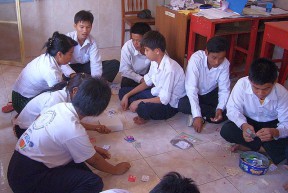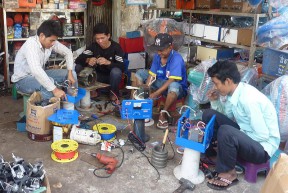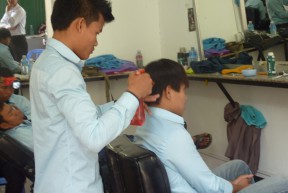What We Do I
The Deaf Development Programme has a number of projects and services:
Basic Education Project
Job Training Project
Deaf Community Development Project
Cambodian Sign Language Project
Sign Language Interpreting Project
Social Services Project
Agriculture Program
Sign Language Unification Committee

The Basic Education project offers a two year program of non-formal education. The project accepts deaf students, 16 years of age or older, and offers a program that first teaches Cambodian Sign Language, basic Khmer literacy, and simple mathematics and life skills. There are six classrooms in the project; Year One and Year Two classes in Phnom Penh, and Year One and Year Two classes in both Kampong Cham and Kampot provinces. The classes in Phnom Penh are located at our head office and the classes in Kampong Cham and Kampot are self-contained classes located in Government schools provided by the Ministry of Education.
Job Training

The Job Training project provides training opportunities for deaf people to develop skills and livelihoods to support themselves and their families. The technical skills that have been offered to deaf people include; motorcycle repairing, sewing, cooking, barbering, wood carving, metal crafts, electrical fan repairing, beauty and hair dressing. Most of the training is outsourced to external training centers run by our partner organizations and private enterprises in Phnom Penh. The project accepts deaf people who have enough Cambodian Sign Language competency and basic literacy to enroll in a training course. Most of these deaf people are graduates from our Basic Education project who then apply for a place in a training course of their choice.
To accommodate deaf people from the provinces for job training in Phnom Penh, the project has a hostel called DDP House, with a maximum capacity of 40 residents. The house parents of DDP House work to supervise the residents, as well as offering a broad range of educational and social experiences to develop the independence of each resident.

In 2009, the Job Training project opened up its own barbershop, and hired a barber teacher to train young deaf men in cutting hair. The barbershop is located on the premises of our head office in Phnom Penh. This is part of an initiative for the Deaf Development Programme to provide our own training programs specifically designed for deaf people and taught in Cambodian Sign Language.
After completing the training course and acquiring a competent level of technical skills, the project supports income generation for the trainees by seeking employment with private enterprises, or by establishing a business in their home areas, either individually or as part of a cooperative with other students.
Deaf Community Development
The Deaf Community Development project consists of three main parts: 1) Outreach activities, 2) Awareness raising, advocacy, and spreading of Cambodian Sign Language, and 3) Deaf Community Centers.
The outreach activities take place in Kampong Cham and Kampot provinces. A team of both deaf and hearing field workers work together to locate new deaf people. The team sometimes travel for up to 3 to 4 hours on motorbikes across rough terrain to find deaf people in remote villages. The field team report that almost every single deaf person that they locate cannot communicate in sign language, has never been to school before, cannot read and write, and has very little, or almost no viable communication skills, or understanding and use of even simple gestures. What is also significant is that these deaf people have never met another deaf person before our field team came to see them.
The outreach team helps to raise awareness of deafness by speaking with families and community members, to inform about the rights of deaf people, and to explain about deaf culture and Cambodian Sign Language. The outreach team then brings all the deaf people from nearby villages to form a commune group and to introduce themselves to one another, to teach Cambodian Sign Language to them and their family members, and to cover basic community education topics.
The Deaf Development Programme has three Deaf Community Centers in Phnom Penh, Kampong Cham, and Kampot. Project staff work to arrange and facilitate regular recreational, social, and educational activities for deaf community members. This a big part of the Deaf Development Programme’s goal to support the development of a collective Deaf identity and to build strong foundations for the Deaf community in Cambodia . A core component of the Deaf Community Centers in the future will be leadership training for potential leaders in the deaf community with the aim of establishing regional committees to lead each center.
Cambodian Sign Language
Sign language is new to Cambodia. Most countries have had sign languages for deaf people for more than one hundred years. In Cambodia there was no sign language before 1997 when a field worker for the Finnish Association of the Deaf began gathering deaf people in Phnom Penh and encouraging them to communicate with each other. From those beginnings, a formal Cambodia Sign Language (CSL) has evolved. With support from the Nippon Foundation, the Deaf Development Programme focused on identifying and recording Cambodian signs and has published them in five books of CSL signs and grammar, both in Khmer and in English. After that first phase of sign language work, DDP has now switched its focus to the teaching of Cambodian Sign Language to deaf and hearing people and to the recognition and acceptance by Cambodian society of CSL as the primary mode of communication for deaf people in the kingdom.
Sign Language Interpreting
Sign language interpreting is a relatively new service offered in Cambodia. There was no sign language in Cambodia before 1997 so there were also no interpreters. As the development and use of Cambodia Sign Language increased in the country, the profession of sign language interpreter became established and the Deaf Development Programme undertook the training of interpreters and the promotion of sign language interpreting as a basic human right for deaf people. Sign language interpreters facilitate full and equal communication between deaf people and hearing people and also provide access for deaf people to education and information, to meetings and public life, to the normal services available to hearing people, and to full participation as a member of society. DDP provides sign language interpreters for NGOs and organizations, for government ministries, for education and training, and for individual deaf people as they go about their daily life.
Social Services
The Maryknoll Deaf Development Programme is the only organization in Cambodia established to try to serve the needs of all deaf people of every age and in every part of the country. As the programs and activities of DDP increase and spread, more deaf people approach DDP and bring with them a wide variety of problems. The Social Services Project now has two social workers, one in Phnom Penh and the other in Kampong Cham, and they deal with every sort of difficulty from AIDS to legal situations to family problems and personal difficulties requiring counseling. While based in Phnom Penh and Kampong Cham, the social workers make many trips to other provinces to assist deaf people in difficulty.
Agriculture Program
The Deaf Development Programme now has a pilot agricultural program to work with deaf people in their home and family environments. After encountering difficulties helping deaf people with other skills training to set up small businesses, and realizing that the majority of the deaf people come from poor rural backgrounds, the Job Training Project developed a new emphasis on agricultural training. A pilot project is currently in operation in Kampot and Kampong Cham Provinces where young deaf adults, still living at home, are being trained in animal husbandry, specifically raising chickens, ducks, pigs, and fish. The young people continue to live at home and their efforts immediately and directly benefit the family while the deaf people themselves remain in a strong family environment instead of moving to the big city for technical training. So far, this pilot agricultural program is working very well and we hope to expand it.
Sign Language Unification Committee
In 1997, as the Deaf Development Programme was beginning to gather young deaf adults and start to develop Cambodian Sign Language with them, the Krousar Thmey NGO began a formal education effort for deaf children, beginning with first graders. Needing a complete sign language immediately in their deaf school environment, Krousar Thmey utilized existing American signs as the basis of the sign language used in their schools. Everyone recognized the inherent problems in having two programs using dissimilar sign languages but various efforts to bring the two sign languages together were not successful. Then in 2013, with assistance and funding from the Pre-College Education Network of the National Technical Institute for the Deaf in the United States, a committee was set up with members and support from both the Deaf Development Programme and Krousar Thmey and was charged with developing and promoting a common Cambodian Sign Language for use by both NGOs. That committee is now working well and making progress with its assigned task.